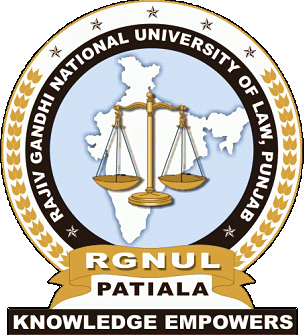About RGNUL
The Rajiv Gandhi National University of Law (RGNUL), Punjab, was established by the State Legislature of Punjab by passing the Rajiv Gandhi National University of Law, Punjab Act 2006 (Punjab Act No. 12 of 2006). The Act incorporated a University of Law of national stature in Punjab, to fulfill the need for a Centre of Excellence in legal education in the modern era of globalization and liberalization. The University acquired approval from the Bar Council of India (BCI) in July 2006.
About the Department of Political Science
Political Science, emerging as a separate academic discipline in the second half of the 19th century, has become an integral part of the social sciences. The study of political philosophy and statecraft, however, has been prevalent for thousands of years, beginning with the first written records. It is closely related to Law, as important legal concepts and constitutional principles originate in political philosophy.
About the Conference
The Department of Political Science at RGNUL is organizing the 1st RGNUL Young Scholars Conference (YSC) as an annual flagship event of the Rajiv Gandhi National University of Law, Punjab. The 1st YSC will be held in February 2024 on the theme “Emerging Trends in India’s Foreign Policy” with a focus on two important regions of the world, West Asia and Africa. It will be a platform for young scholars to deliberate on issues related to India’s foreign policy in the region.
Venue
Rajiv Gandhi National University of Law, Punjab (Bhadson-Patiala Road, Sidhuwal, Patiala, Punjab – 147006)
Objective of Conference
- The primary objective is to facilitate in-depth scholarly discussions and encourage the exchange of ideas among academics and researchers in a compact round-table setting.
- Encourage interdisciplinary perspectives by bringing together scholars from various academic fields, including International Relations, Political Science, Economics, History, Sociology, and Cultural Studies.
- Encourage comparative studies that analyze India’s foreign policy in the African and West Asian context compared to other global actors, such as China, the United States, and European nations.
- Explore the academic insights and research findings that have direct policy implications for shaping India’s foreign policy towards West Asia and Africa.
- Create a platform for academics to network, form research collaborations, and build lasting academic relationships for future collaborative projects.
- Facilitate opportunities for young researchers to publish conference papers in academic journals or edited volumes, contributing to the scholarly literature on India-West Asia and India-Africa relations.
- Encourage the participation of RGNUL students, providing them with a unique opportunity to engage with cutting-edge research, network with scholars, and develop an understanding of real-world diplomatic challenges.
Conference Agenda
The conference shall start with a Keynote Address on the theme “Emerging Trends in India’s Foreign Policy” with a focus on West Asia and Africa, followed by two technical sessions, with two expert Chairs for each. The themes for the technical sessions would be:
- Challenges and Opportunities for India in West Asia.
- Challenges and Opportunities for India in Africa.
Target Audience
Students, Research Scholars, and Ph.D. Candidates from higher education institutions and research think tanks, pursuing studies in the domains of Political Science, International Relations, International Political Economy, International Law, and the like. Applicants must be actively engaged in research on the West Asia or Africa regions.
Themes
- Historical Narratives
- Revisiting Historical Narratives: Deconstructing Eurocentric Perspectives and Reasserting Indigenous Voices
- Cultural Heritage and Transnational Connections: Migration and Diaspora Engagement
- Leveraging History: Trade Routes and the Connectivity Programs
- Unstable regimes in West Asia and Africa and India’s Approach
- India’s Non-Interference Policy: Navigating the challenges of engagement with unstable regimes while maintaining a principled foreign policy
- India’s Contributions to Mediating Conflicts and Fostering Post-Conflict Reconstruction
- Oil Politics
- South-South Cooperation at Multilateral Forums
- Climate Crisis and Sustainable Development
- WTO – TRIPS and Food Security
- G20 and BRICS
- India’s Soft Power Approach in the Regions
- Cultural Diplomacy and Soft Power: Investigating the use of Intangible Heritage and the effectiveness of India’s Media Outreach, Cultural Events, and Public Diplomacy Initiatives in Shaping Perceptions and Attitudes
- India’s Economic Soft Power: Assessing the Impact of India’s Economic Engagement, Development Assistance, and Trade Relations on Soft Power Projection
- India’s Multipolarity: Exploring India’s Soft Power Strategies in the Context of a Shifting Global Order and Emerging Powers
- West Asia and Africa in International Law
- India’s stance on the application and compliance with International Humanitarian Law in armed conflicts in Africa and the Middle East, particularly in the context of the Israel-Hamas war.
- Investigating India’s maneuvering in the legal frameworks governing the exploitation and management of natural resources in Africa and the Middle East, including the rights of indigenous communities and environmental protection.
- Exploring the legal and ethical implications of emerging technologies such as artificial intelligence, cyber warfare, and drones in Africa and the Middle East.
The themes are only suggestive and non-exhaustive in nature.
Formatting Guidelines
- The file must be in Microsoft Word editable format.
- The Citation style to be followed is APA 7th edition.
- Font: Times New Roman, Size: 12, Spacing: 1.5, Alignment: Justified
- The title must be size 14 font and bold.
- In-text citations and endnote referencing are to be followed. Footnoting must be avoided to the extent possible.
Submission Guidelines
Abstract: The abstract must range between 300 to 500 words, outlining the methodology and the tentative outcomes of the research. The abstract should be on a topic of contemporary interest in the area of India-West Asia or India-Africa Relations.
Full Paper: The word limit for full paper submission is 6000-9000 words. The paper must consist of an Introduction, Research Methodology, Literature Review, Results and Discussion, and Conclusion.
Important Dates
- Last date for Submission of abstracts: 10th January 2024
- Announcement of shortlisted abstracts: 15th January 2024
- Last date of Submission of Papers: 10th February 2024
- Date of Conference: 17th February 2024 (Saturday)
Registration Fee
- Students: Rs. 1,500/-
- Ph.D. Scholars: Rs. 2,000/-
- Academicians: Rs. 3,000/-
- Fees for co-authors shall be applicable as per the category.
- An email confirming acceptance of the paper for presentation will be sent through email, containing the payment link and last date for making the payment.
- Food and lodging costs shall be covered through the registration fee
Submission Procedure
- Abstracts and full papers have to be submitted at politicalscience@rgnul.ac.in.
- Submission must be an original work of the author and empirical studies would be given preference over doctrinal research.
- A maximum of two authors are allowed per paper.
- A brief bio-note (maximum 150 words) should be attached to the abstract, detailing the designation and institutional affiliation of the author(s).
- The abstracts will be double-blind reviewed before acceptance for presentation, subject to submission of full paper in a timely manner.
- The selected papers will be invited for presentation at the conference and will be published in the form of an edited volume after a plagiarism check and double-blind peer review.
- A self-declaration must be submitted along with the full paper regarding the originality of the work and that it has not been published/sent for publication anywhere else.
The official notification is here.

